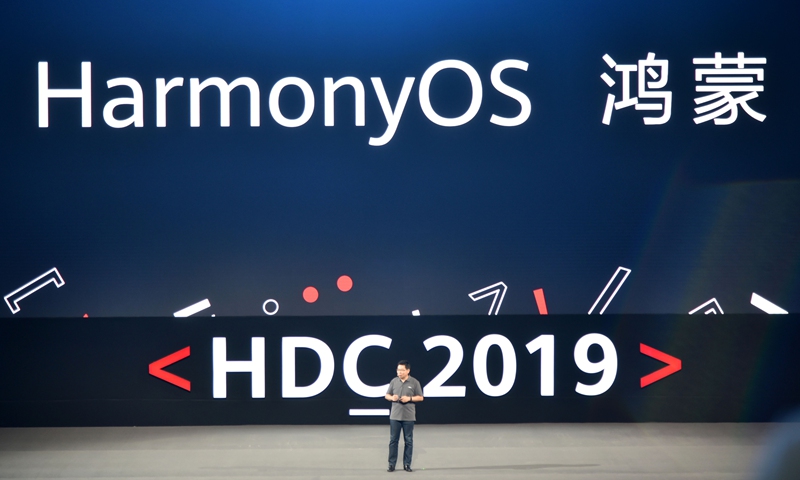Huawei reportedly set to release Mate Watch loaded with HarmonyOS
Source:Global Times Published: 2020/6/27 13:23:40

Richard Yu, CEO of Huawei's Consumer Business Group, unveils the HarmonyOS, or Hongmeng in Chinese, during the Huawei Developer Conference held in Dongguan, south China's Guangdong Province, Aug. 9, 2019. Photo: Xinhua
Chinese tech company Huawei is reportedly set to release its Mate Watch loaded with HarmonyOS, a self-developed operating system that aims to challenge Google's monopoly amid the US crackdown.
Industry insiders said the move signals the firm is one step closer to completing a hardware ecosystem that will lay a foundation for HarmonyOS on Huawei smartphones in the future.
The Mate Watch is expected to be released at the same time as Huawei's Mate 40, according to industry media. If that is true, it would be the first Huawei smart watch operated by HarmonyOS.
The operating system has already been applied to Huawei's notebook, pad, router and other intelligent devices like TVs.
Huawei had not responded to an interview request from the Global Times by press time.
As Huawei plans to apply HarmonyOS to a variety of hardware devices and eventually smartphones, industry insiders see the potential move as a significant step in testing the operating system's function in small-sized Internet of Things devices. It could also mirror market acceptance.
In the first quarter, Huawei's shipments of smart watches grew 113 percent year-on-year to 2.1 million units. The company ranked second after Apple in global market share, according to a report released by research firm Canalys.
"Huawei's smart watch, with its popularity, is a perfect device for testing the water. The next testing field could be intelligent vehicles and the final application will be smartphones," Ma Jihua, a veteran industry analyst and close follower of Huawei, told the Global Times on Saturday.
Ma predicted that as China's 5G rollout is in a full swing, Huawei will ride on the boom and gain a foothold in the market by launching a 5G smartphone loaded with HarmonyOS.
Huawei launched HarmonyOS in August 2019 amid the US' malicious crackdown that cut it off from the Android operating system. Richard Yu Chengdong, head of the company's consumer business, said the firm will consider using its own system if it's not allowed to access Google's Android service.
Global Times